中考英语介词复习(无答案)
- 格式:doc
- 大小:165.00 KB
- 文档页数:10
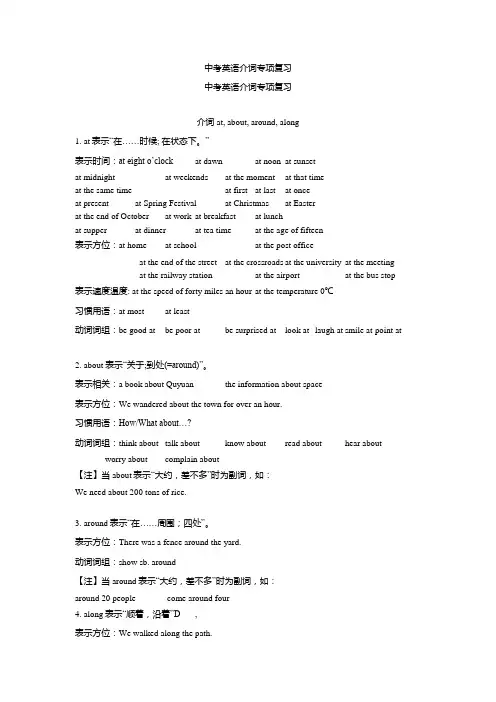
中考英语介词专项复习中考英语介词专项复习介词 at, about, around, along1. at表示“在……时候; 在状态下。
”表示时间:at eight o’clock at dawn at noon at sunsetat midnight at weekends at the moment at that timeat the same time at first at last at onceat present at Spring Festival at Christmas at Easterat the end of October at work at breakfast at lunchat supper at dinner at tea time at the age of fifteen表示方位:at home at school at the post officeat the end of the street at the crossroads at the university at the meetingat the railway station at the airport at the bus stop 表示速度温度: at the speed of forty miles an hour at the temperature 0℃习惯用语:at most at least动词词组:be good at be poor at be surprised at look at laugh at smile at point at2. about 表示“关于;到处(=around)”。
表示相关:a book about Quyuan the information about space表示方位:We wandered about the town for over an hour.习惯用语:How/What about…?动词词组:think about talk about know about read about hear about worry about complain about【注】当about表示“大约,差不多”时为副词,如:We need about 200 tons of rice.3. around表示“在……周围;四处”。
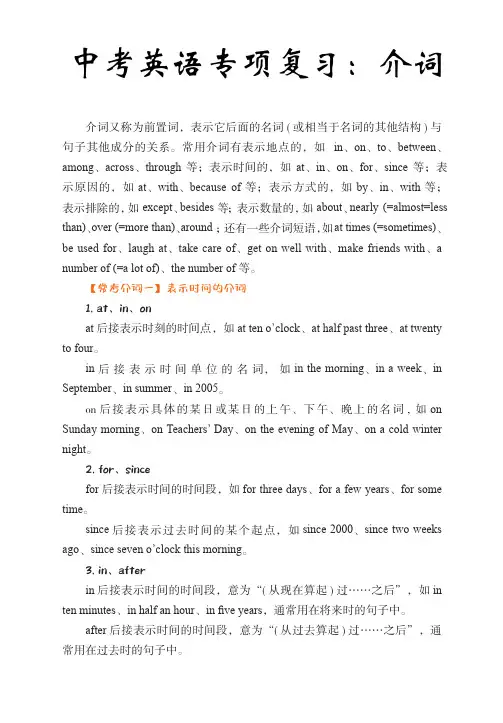
中考英语专项复习:介词介词又称为前置词,表示它后面的名词 ( 或相当于名词的其他结构 ) 与句子其他成分的关系。
常用介词有表示地点的,如 in、on、to、between、among、across、through 等;表示时间的,如 at、in、on、for、since 等;表示原因的,如 at、with、because of 等;表示方式的,如 by、in、with 等;表示排除的,如 except、besides 等;表示数量的,如 about、nearly (=almost=less than)、over (=more than)、around ;还有一些介词短语,如at times (=sometimes)、be used for、laugh at、take care of、get on well with、make friends with、a number of (=a lot of)、the number of 等。
1. at、in、onat 后接表示时刻的时间点,如 at ten o’clock、at half past three、at twenty to four。
in 后 接 表 示 时 间 单 位 的 名 词, 如 in the morning、in a week、in September、in summer、in 2005。
on 后接表示具体的某日或某日的上午、下午、晚上的名词 , 如 on Sunday morning、on Teachers’ Day、on the evening of May、on a cold winter night。
2. for、sincefor 后接表示时间的时间段,如 for three days、for a few years、for some time。
since 后接表示过去时间的某个起点,如 since 2000、since two weeks ago、since seven o’clock this morning。
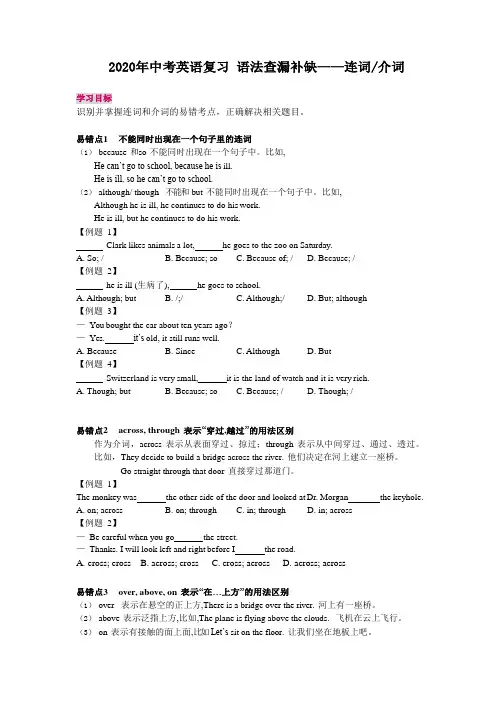
2020年中考英语复习语法查漏补缺——连词/介词学习目标识别并掌握连词和介词的易错考点,正确解决相关题目。
易错点1不能同时出现在一个句子里的连词(1)because 和so 不能同时出现在一个句子中。
比如,He can’t go to school, because he is ill.He is ill, so he can’t go to school.(2)although/ though 不能和but 不能同时出现在一个句子中。
比如,Although he is ill, he continues to do his work.He is ill, but he continues to do his work.【例题1】Clark likes animals a lot, he goes to the zoo on Saturday.A. So; /B. Because; soC. Because of; /D. Because; /【例题2】he is ill (生病了), he goes to school.A. Although; butB. /;/C. Although;/D. But; although【例题3】—You bought the car about ten years ago?—Yes. it’s old, it still runs well.A. BecauseB. SinceC. AlthoughD. But【例题4】Switzerland is very small, it is the land of watch and it is very rich.A. Though; butB. Because; soC. Because; /D. Though; /易错点2across, through 表示“穿过,越过”的用法区别作为介词,across 表示从表面穿过、掠过;through 表示从中间穿过、通过、透过。
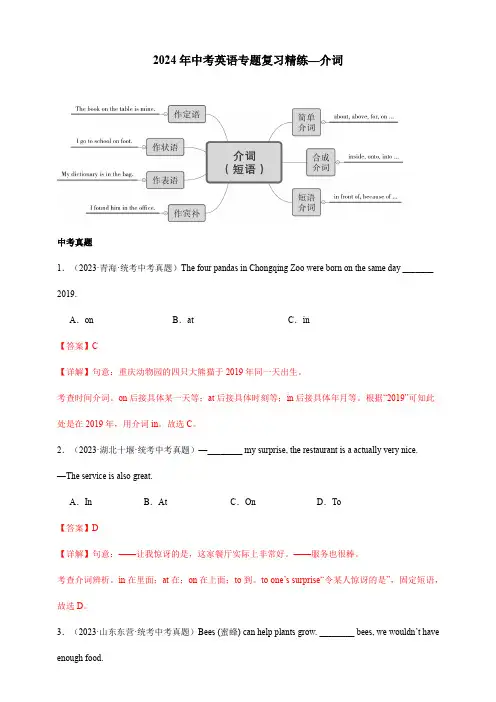
2024年中考英语专题复习精练—介词中考真题1.(2023·青海·统考中考真题)The four pandas in Chongqing Zoo were born on the same day _______ 2019.A.on B.at C.in【答案】C【详解】句意:重庆动物园的四只大熊猫于2019年同一天出生。
考查时间介词。
on后接具体某一天等;at后接具体时刻等;in后接具体年月等。
根据“2019”可知此处是在2019年,用介词in。
故选C。
2.(2023·湖北十堰·统考中考真题)—________ my surprise, the restaurant is a actually very nice.—The service is also great.A.In B.At C.On D.To【答案】D【详解】句意:——让我惊讶的是,这家餐厅实际上非常好。
——服务也很棒。
考查介词辨析。
in在里面;at在;on在上面;to到。
to one’s surprise“令某人惊讶的是”,固定短语,故选D。
3.(2023·山东东营·统考中考真题)Bees (蜜蜂) can help plants grow. ________ bees, we wouldn’t have enough food.A.From B.Like C.Except D.Without【答案】D【详解】句意:蜜蜂能帮助植物生长。
没有蜜蜂,我们将没有足够的食物。
考查介词辨析。
From从;Like像;Except除了……之外;Without没有。
根据“Bees can help plants grow.”可知,没有蜜蜂,植物生长慢,我们将会没有足够的食物。
故选D。
4.(2023·江苏徐州·中考真题)No one helped me. I did it all ________ myself.A.for B.of C.by D.about【答案】C【详解】句意:没有人帮我。
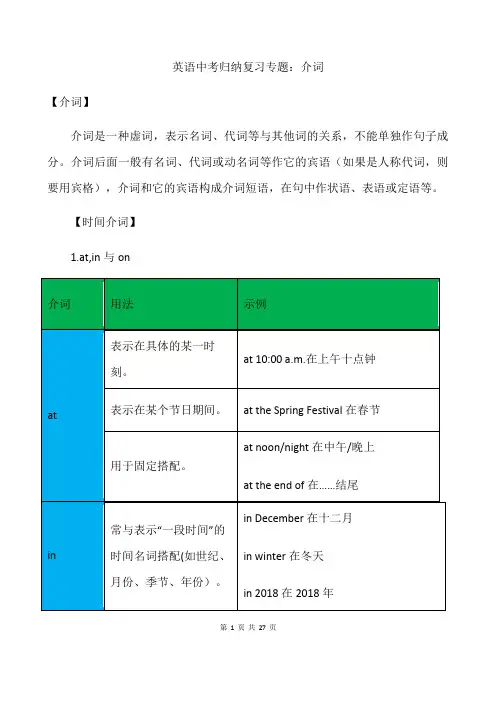
英语中考归纳复习专题:介词【介词】介词是一种虚词,表示名词、代词等与其他词的关系,不能单独作句子成分。
介词后面一般有名词、代词或动名词等作它的宾语(如果是人称代词,则要用宾格),介词和它的宾语构成介词短语,在句中作状语、表语或定语等。
【时间介词】1.at,in与on第 1 页共27 页2.from,since与for第 2 页共27 页3.before与after第 3 页共27 页4.until,during与by第 4 页共27 页【考点训练1】1.China successfully hosted the Belt and Road Forum _____ May,2017. ()A.onB.inC.byD.at2.We usually have the first class ___ 8:00 in the morning. ()A.inB.onC.atD.from3.More and more young people go skating _____ winter. ()A.atB.inC.onD.to4.I’ve had this mobile phone ___ three years. ()第 5 页共27 页A.byB.fromC.forD.since5.His grandfather has been ill ___ last year. ()A.forB.sinceC.fromD.after6.___ April 22nd,people around the world celebrate Earth Day in different ways. ()A.InB.AtC.OnD.For【方位介词】1.at与in第 6 页共27 页2.in,on与to第7 页共27 页【图解助记】3.over,above,on,under与below第8 页共27 页【图解助记】4.其他方位介词第9 页共27 页【考点训练2】1.—Where is Mary flying?—She is flying to France soon.She will arrive ___ Paris on the morning of July 2. ()A.toB.atC.inD.on2.I can’t see Lucy because she is ___ the tree. ()A.in front ofB.behindC.next toD.beside3.Russia lies ___ the north of China. ()A.onB.toC.inD.at第10 页共27 页4.The workers will build a new railroad ___ the two cities. ()A.amongB.inC.betweenD.at5.—Oh,my God! I’ve left my keys in the room.I’ll have to get in ___ the window. —It’s dangerous.You’d better wait for your dad to come back. ()A.past B.over C.across D.through【方式介词】第11 页共27 页考点训练3】用适当的方式介词填空。
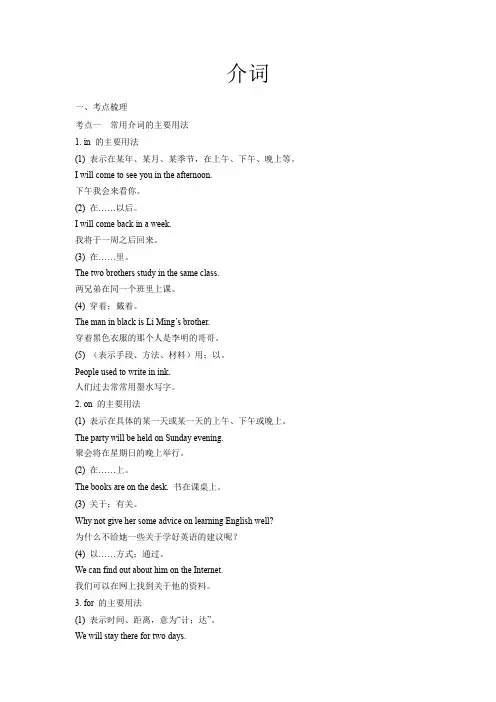
介词一、考点梳理考点一常用介词的主要用法1. in 的主要用法(1) 表示在某年、某月、某季节,在上午、下午、晚上等。
I will come to see you in the afternoon.下午我会来看你。
(2) 在……以后。
I will come back in a week.我将于一周之后回来。
(3) 在……里。
The two brothers study in the same class.两兄弟在同一个班里上课。
(4) 穿着;戴着。
The man in black is Li Ming’s brother.穿着黑色衣服的那个人是李明的哥哥。
(5) (表示手段、方法、材料)用;以。
People used to write in ink.人们过去常常用墨水写字。
2. on 的主要用法(1) 表示在具体的某一天或某一天的上午、下午或晚上。
The party will be held on Sunday evening.聚会将在星期日的晚上举行。
(2) 在……上。
The books are on the desk. 书在课桌上。
(3) 关于;有关。
Why not give her some advice on learning English well?为什么不给她一些关于学好英语的建议呢?(4) 以……方式;通过。
We can find out about him on the Internet.我们可以在网上找到关于他的资料。
3. for 的主要用法(1) 表示时间、距离,意为“计;达”。
We will stay there for two days.我们将在那里逗留两天。
(2) 表示“当作;作为”。
I’d like some bread and milk for breakfast.我想要些面包和牛奶当早餐。
(3) 表示理由或原因,意为“因为;由于”。
The match is cancelled for the heavy rain.比赛因大雨而取消。
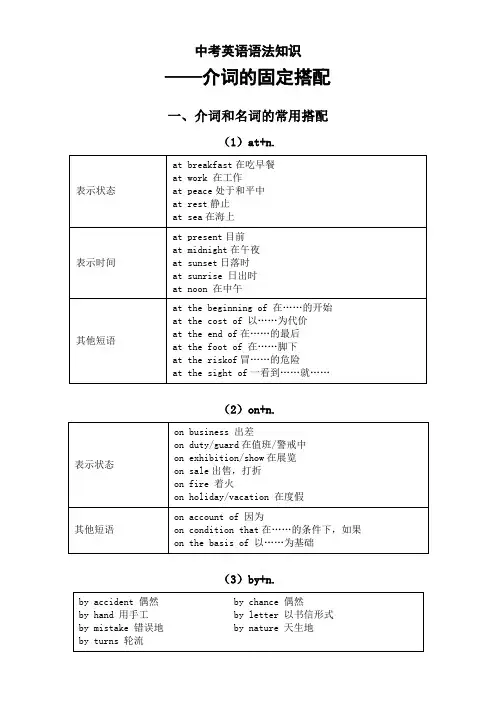
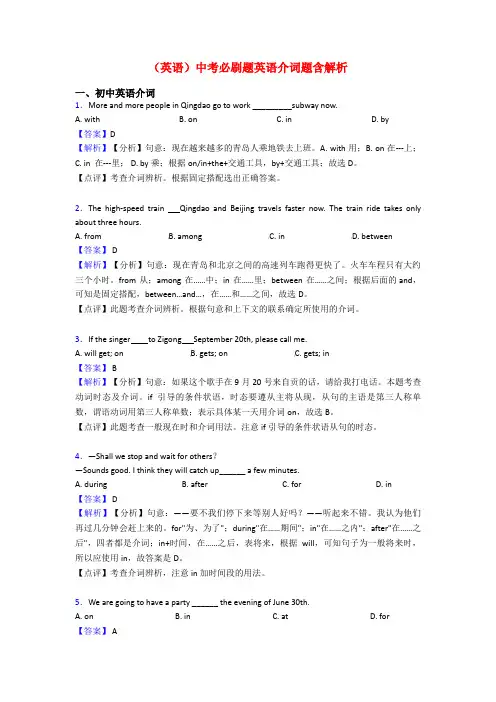
(英语)中考必刷题英语介词题含解析一、初中英语介词1.More and more people in Qingdao go to work _________subway now.A. withB. onC. inD. by【答案】D【解析】【分析】句意:现在越来越多的青岛人乘地铁去上班。
A. with 用;B. on 在---上;C. in 在---里;D. by乘;根据on/in+the+交通工具,by+交通工具;故选D。
【点评】考查介词辨析。
根据固定搭配选出正确答案。
2.The high-speed train Qingdao and Beijing travels faster now. The train ride takes only about three hours.A. fromB. amongC. inD. between【答案】 D【解析】【分析】句意:现在青岛和北京之间的高速列车跑得更快了。
火车车程只有大约三个小时。
from 从;among 在……中;in 在……里;between 在……之间;根据后面的and,可知是固定搭配,between…and…,在……和……之间,故选D。
【点评】此题考查介词辨析。
根据句意和上下文的联系确定所使用的介词。
3.If the singer to Zigong September 20th, please call me.A. will get; onB. gets; onC. gets; in【答案】 B【解析】【分析】句意:如果这个歌手在9月20号来自贡的话,请给我打电话。
本题考查动词时态及介词。
if 引导的条件状语,时态要遵从主将从现,从句的主语是第三人称单数,谓语动词用第三人称单数;表示具体某一天用介词on,故选B。
【点评】此题考查一般现在时和介词用法。
注意if引导的条件状语从句的时态。
4.—Shall we stop and wait for others?—Sounds good. I think they will catch up______ a few minutes.A. duringB. afterC. forD. in【答案】 D【解析】【分析】句意:——要不我们停下来等别人好吗?——听起来不错。
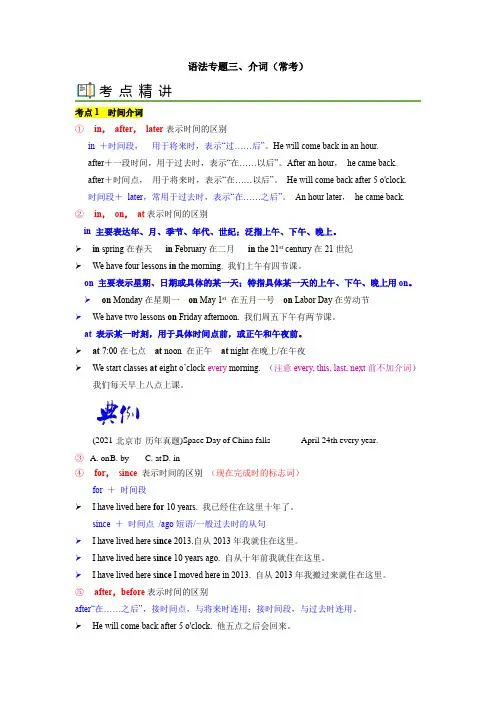
语法专题三、介词(常考)考点1 时间介词①in,after,later表示时间的区别in +时间段,用于将来时,表示“过……后”。
He will come back in an hour.after+一段时间,用于过去时,表示“在……以后”。
After an hour,he came back.after+时间点,用于将来时,表示“在……以后”。
He will come back after 5 o'clock.时间段+later,常用于过去时,表示“在……之后”。
An hour later,he came back.②in,on,at表示时间的区别in 主要表达年、月、季节、年代、世纪;泛指上午、下午、晚上。
➢in spring在春天in February在二月in the 21st century在21世纪➢We have four lessons in the morning. 我们上午有四节课。
on 主要表示星期、日期或具体的某一天;特指具体某一天的上午、下午、晚上用on。
➢on Monday在星期一on May 1st在五月一号on Labor Day在劳动节➢We have two lessons on Friday afternoon. 我们周五下午有两节课。
at 表示某一时刻,用于具体时间点前,或正午和午夜前。
➢at 7:00在七点at noon 在正午at night在晚上/在午夜➢We start classes at eight o’clock every morning. (注意every, this, last, next前不加介词)我们每天早上八点上课。
(2021·北京市·历年真题)Space Day of China falls ______ April 24th every year.③ A. on B. by C. at D. in④for,since 表示时间的区别(现在完成时的标志词)for +时间段➢I have lived here for 10 years. 我已经住在这里十年了。

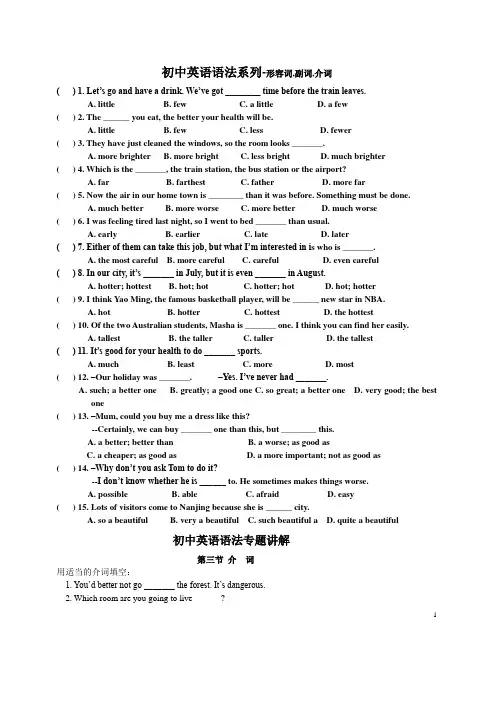
初中英语语法系列-形容词,副词,介词( ) 1. Let’s go and have a drink. We’ve got ________ time before the train leaves.A. littleB. fewC. a littleD. a few( ) 2. The ______ you eat, the better your health will be.A. littleB. fewC. lessD. fewer( ) 3. They have just cleaned the windows, so the room looks _______.A. more brighterB. more brightC. less brightD. much brighter( ) 4. Which is the _______, the train station, the bus station or the airport?A. farB. farthestC. fatherD. more far( ) 5. Now the air in our home town is ________ than it was before. Something must be done.A. much betterB. more worseC. more betterD. much worse( ) 6. I was feeling tired last night, so I went to bed _______ than usual.A. earlyB. earlierC. lateD. later( ) 7. Either of them can take this job, but what I’m interested in i s who is _______.A. the most carefulB. more carefulC. carefulD. even careful( ) 8. In our city, it’s _______ in July, but it is even _______ in August.A. hotter; hottestB. hot; hotC. hotter; hotD. hot; hotter( ) 9. I think Yao Ming, the famous basketball player, will be ______ new star in NBA.A. hotB. hotterC. hottestD. the hottest( ) 10. Of the two Australian students, Masha is _______ one. I think you can find her easily.A. tallestB. the tallerC. tallerD. the tallest( ) 11. It’s good for your health to do _______ sports.A. muchB. leastC. moreD. most( ) 12. –Our holiday was _______. –Yes. I’ve never had _______.A. such; a better oneB. greatly; a good oneC. so great; a better oneD. very good; the bestone( ) 13. –Mum, could you buy me a dress like this?--Certainly, we can buy _______ one than this, but ________ this.A. a better; better thanB. a worse; as good asC. a cheaper; as good asD. a more important; not as good as( ) 14. –Why don’t you ask Tom to do it?--I don’t know whether he is ______ to. He sometimes makes things worse.A. possibleB. ableC. afraidD. easy( ) 15. Lots of visitors come to Nanjing because she is ______ city.A. so a beautifulB. very a beautifulC. such beautiful aD. quite a beautiful初中英语语法专题讲解第三节介词用适当的介词填空:1. You’d better not go _______ the forest. It’s dangerous.2. Which room are you going to live ______?13. The building is ______ fire. There are some people ______ the top floor.4. Before 1990 there was no airline _______ the two cities.5. It’s not good to come late _______ school.6. What’s wrong _______ your bike?7. Thank you very much _______ coming to see me.8. I couldn’t finish it _______ your help.9. Don’t laugh _______ others’ m istakes.10. Do the twins look _______ their father?11. –How do you usually come to school every day?-Sometimes _______ bike, sometimes _______ foot.12. It’s very kind _______ you to help me _______ my maths.13. Don’t read _______ the sun. It’s bad ________ your eyes.14. The teacher told us the moon travels ________ the earth.15. You must learn these words _______ heart, and answer my questions ____ English.( ) 1. China lies _______ the east of Asia and ______ the north of Australia.A. to; toB. in; toC. to; inD. in; on( ) 2. ______ the afternoon of March 8, the women in the city had a big party.A. ToB. InC. AtD. On( ) 3. We all agree _______ you. Let’s start at once.A. toB. forC. withD. on( ) 4. Where’s Lily? We are all here _______ her.A. besidesB. aboutC. exceptD. with( ) 5. Does your father go to work, _______ foot or _______ bike?A. on; withB. with; onC. by; onD. on; by( ) 6. Lucy was _______ duty yesterday, but she forgot to clean the classroom.A. inB. onC. atD. of( ) 7. Timmy goes to school _______ every day. It’s 5 minutes’ walk from his home to school.A. in a busB. by planeC. on footD. by boat( ) 8. Mum, today is Mother’s Day. Mike and I want to invite you to have dinner _______ us at Shanghai Restaurant, which is famous _______ its seafood.A. with; ofB. with; forC. for; toD. to; for( ) 9. He has got a chair to sit _______, but nobody to talk _______.A. on; toB. /; withC. on; /D. /; to( ) 10. Jack has studied Chinese in this school _______ the year of 2000.A. sinceB. inC. onD. by( ) 11. –How are you going to the train station to meet your aunt?--I’m going there _______ my car.A. byB. inC. toD. on( ) 12. Andy often helps her mother ________ the housework on Sunday afternoon.A. toB. withC. forD. of( ) 13. –You’d better not go out now. it’s raining.2--It doesn’t matter. My new coat can keep _______ rain.A. inB. ofC. withD. off( ) 14. English is widely used ________ travelers and business people all over the world.A. toB. forC. asD. by( ) 15. My sister usually thinks _______ her own language first. Then she turns her words into English.A. byB. inC. withD. through( ) 16. –It’s kind _______ you to come to see me.--It’s a pleasure. You were so kind _______ me.A. of; withB. for; withC. of; toD. for; to( ) 17. –Is the manager in?--Sorry, he is out. But he will be back _______ three o’clock.A. inB. onC. untilD. before( ) 18. _______ the age of fifteen, she had written scores of articles for a newspaper.A. AtB. BeforeC. SinceD. By( ) 19. In China, the price of TV sets has been reduced ________ 30% in the last three years.A. onB. byC. withD. for( ) 20. When you called on me, I was _______ a visit to Mr Smith.A. onB. atC. inD. to( ) 21. –Bob, you are wanted _______ the phone. –Thanks a lot.A. onB. byC. ofD. for( ) 22. The soil is made _______ the dead leaves of the trees.A. up ofB. ofC. fromD. by( ) 23. I didn’t have any breakfast _______ a cup of milk.A. besidesB. except forC. exceptD. for( ) 24. We’re sure you’ll be famous _______ a writer before long.A. asB. forC. withD. by( ) 25. The writer often sat up far into the night working _______ a new novel.A. forB. onC. withD. in( ) 26. You look tired. ________ working indoors you should be out for a walk.A. Ahead ofB. Instead ofC. In front ofD. In spite of( ) 27. You must stand _______ line when you are waiting _______ a bus.A. on; inB. in; forC. in; onD. on; for( ) 28. Man landed on the moon in 1969 for the first time. Have you ever heard ______ it?A. onB. toC. ofD. from( ) 29. It’s very nice ______ you to get me two tickets _______ the World Cup.A. for; ofB. of; forC. to; forD. of; to( ) 30. The woman feels worried _______ her sick baby.A. forB. toC. onD. about( ) 31. –What do you think of the report on the UFOs?--Great! Many students were interested in it and they kept on standing ______ the end of themeeting.3A. untilB. inC. atD. by( ) 32. Have you got any books _______ science?A. atB. aboutC. ofD. in( ) 33. She likes reading _______ many different subjects.A. ofB. atC. onD. in( ) 34. Mr Wang is very strict. His students are afraid _______ him.A. atB. ofC. aboutD. to( ) 35. This story happened _______ the last few years.A. atB. sinceC. duringD. for( ) 36. We should do something to stop sandstorms ______ happening again and again.A. fromB. onC. byD. to( ) 37. China became a WTO member _______ December 11th , 2001.A. onB. inC. atD. of( ) 38. There’s a smile on her face. I think she’s _______ my work.A. sorry forB. worried aboutC. pleased withD. afraid of第四节连词( ) 1. –I won’t go to the party tomorrow.--________ you told me you would. What’s happening?A. ButB. SoC. AndD. Or( ) 2. Mike did something wrong, _______ the headmaster is talking with him.A. soB. butC. andD. or( ) 3. Jim has been in the factory for two years _______ he left school.A. whenB. sinceC. as soon asD. whether( ) 4. Mike is good at playing basketball _______ Bruce does well in football.A. whenB. untilC. sinceD. while( ) 5. –Excuse me. Do you have a table for two?--I’m sorry, ______ there aren’t any seats now. Would you mind waiting for a while?A. butB. andC. orD. so( ) 6. You’d better do it _______ your mother did.A. whenB. asC. likeD. because( ) 7. Stop cutting trees, _______ the earth will become worse and worse.A. andB. butC. orD. then( ) 8. Do you want to stay at home _______ go shopping with us?A. andB. butC. orD. so( ) 9. He was riding to school _______ he was hit by a car this morning.A. whileB. whenC. asD. so( ) 10. The war was over about three months ago, _______ the American soldiers in Iraq are still having a lot of trouble to deal with.A. orB. andC. butD. for( ) 11. The mountain was _______ steep _______ few people in our city reached the top.4A. so; asB. so; thatC. as; asD. too; to( ) 12. Mr Brown knows little Japanese, _______ he can’t understand the instructions on the bottle of the pills.A. soB. orC. butD. for( ) 13. It’s raining outside. Put on more clothes, _______ you may catch a cold.A. andB. butC. orD. though( ) 14. –What is writing brush, do you know? --It’s used _______ writing and drawing.A. withB. toC. forD. by( ) 15. _______ my mother ________ my sister watches football games these days.A. Either; norB. Both; andC. Neither; norD. Neither; or( ) 16. Mr Smith is an English teacher _______ will teach us English next term.A. orB. andC. butD. so( ) 17. I may live _______ in a hotel _______ in a friend’s house.A. both; andB. either; orC. neither; norD. between; and( ) 18. I’m sorry, _______ I can’t help you with your homework.A. andB. butC. orD. then( ) 19. This coat will not lose colour ________ it’s washed.A. untilB. tillC. beforeD. after( ) 20. I think we should get this computer, _______ it will take up more space.A. butB. althoughC. andD. so( ) 21. Stop smoking, _______ you will get better soon.A. andB. orC. thatD. after( ) 22. Gray didn’t recognize his old classmate ________ he was told her name.A. whenB. unlessC. soD. until( ) 23. I was about to leave the office _______ the telephone rang.A. whenB. afterC. beforeD. while( ) 24. A lot of new buildings have been put up in our university. It is no longer the same _______ it used to be.A. like whatB. thatC. asD. what( ) 25. He is a scientist, ________ a singer as well.A. butB. norC. orD. and( ) 26. John fell asleep ________ he was listening to the music.A. afterB. beforeC. whileD. as soon as( ) 27. ________ our football team failed in the match, we did our best.A. ThoughB. ButC. BecauseD. As( ) 28. We bought Mary a present, _______ she didn’t like it.A. andB. butC. orD. so( ) 29. It was very late, _______ the students still went on repairing their desks and chairs.A. andB. orC. soD. but( ) 30. _______ China isn’t rich now, _______ we’re working hard to make her richer and richer.A. Though; butB. Though; /C. Both; andD. Because; so( ) 31. –You’d better remember what I said yesterday, _______ others will laugh at you.5--Sure. I’ll do it _______ you told me.A. or; asB. and; asC. or; afterD. and; after( ) 32. Though we students have _______ money _______ time, we try out best to help them.A. both; andB. neither; norC. either; orD. not; but( ) 33. I won’t believe you _______ I see it with my own eyes.A. ifB. whenC. untilD. while( ) 34. I must finish the work _______ I go home.A. beforeB. whenC. untilD. if6。
中考英语专题复习之介词【知梳理】一、考介的用法[ 知接 ]分例in, at, on, between, since, for, during, until, till, by, from,表示to, by, before, pastin, at, on, around, before, in front of, between, behind,表示方向beside, near, under, above, below, ,next to, among表示来回的to, towards, round, around, though, across, from⋯to,方向into, out of, off, alongby, to, like, unlike, of, except, about, against, with, but,其余as, without(一)时间介词1.at、in 、on 表示的区(1)at 表示详细的点,常用于表示点及某些中。
如:at Christmas(在圣 );at six o ock(’cl在 6 点 );at night(在夜晚 );at the end of(在⋯⋯束 );at the age of(在⋯⋯);at last(最,最后 )。
(2)in 能够表示从在算起到若干此后,意“在⋯⋯后”,用于一般未来或去未来。
如:Can you finish drawing a good horse in five minutes?你能在 5 分内画一匹漂亮的?(3)on 用于表示确立的,详细某一天或详细某一天的上午、下午、夜晚或一般日等。
如:on December 1st,1994 (在 1994 年 12 月 1 日);on Teachers ’ Day在 (教 )on Monday morning (在礼拜一上午 );on a cold morning (在一个严寒的清晨 );on the night of October 22nd (在 10 月 22 日夜晚 );on Christmas Day (在圣 )。
介词和连词中考命题趋势考纲解读(介词和连词在近5年考试中的考查点)1. 熟悉和掌握常用介词和连词的用法。
2. 了解和运用一些常见的介词短语及连词的使用方法。
3. 能正确区分并列连词和从属连词,并掌握其用法。
命题预测1. 介词的考查方式以单项选择的形式为主,也会在单词拼写、完形填空中进行考查。
2. 据统计,介词的常考点有:(1)表示时间的介词,如:2019·临沂,17题;2019·咸宁,30题。
(2)表示地点方位的常用介词,如:2019·大庆,2题。
(3)表示方式、手段或工具的介词,如:2019·云南,21题。
(4)介词的常见搭配,如:2019·徐州,7题。
连词的考点有:(1)并列连词的用法,如:2019·绥化,6题;2019·临沂,28题。
(2)从属连词的用法,如:2019·长春,13题;2019·乐山,30题。
3. 预计今后中考中介词考查的重点将是其基本用法(同时也要注意介词的常见搭配的情况);连词的考查将以并列连词和从属连词基本含义为重点,也要注意考查连词的特殊用法,比如:“就近原则”,不能出现在同一个句子中的连词等。
一、介词概述:介词又叫前置词,是一种虚词。
介词是一种用来表示词与词或者词与句之间的关系的词,在句中不能单独作句子成分。
介词一定要有宾语,充当宾语的一般有名词、代词或相当于名词的其他词、短语或句子。
如:I am in school. in the morningThanks for helping me. What about going for a walk?二、介词的句法功能:介词不能独立在句中作成分,介词后必须与名词、代词或动名词构成介词短语在句中充当一个成分,表示人、物、事件等与其他人、物、事件等之间的关系。
1. 作定语:The book on the table is mine.2. 作状语:We have breakfast at seven. (表时间);They were late for meeting because of the heavy rain. (表原因);They started the machine by pressing the button. (表方式)3. 作表语:My dictionary is in the bag.4. 作宾语补足语:I found him in the office.三、介词分类:①时间介词;②方位介词;③方式介词;④目的介词;⑤原因介词;⑥运动方向介词;⑦比较介词等等。
中考英语--复习专项练习题(介词)1 Children get gifts ____ Christmas and ____ their birthdays.A. on; onB. at; onC. in; inD. in; on2 -There is nothing ____tomorrow afternoon, is there?-No. We can have a game of table tennis.A. onB. inC. outD. up3 A lot of students in our school were born____March, 1981.A. inB. atC. onD. since4 Tim suddenly returned____ a rainy night.A. onB. atC. inD. during5 My grandfather was born____Oct. 10, 1935.A. onB. inC. atD. of6 The train is starting___five minutes.A. inB. atC. forD.stil7 Mike does his exercises ____ seven _____ the evening.A. on; toB. at; inC. by; ofD. at; on8 The population of the world has grown very fast ____ four hundred years.A. for past theB. in the passC. in the pastD. for past9 We returned to our hometown___.A. next weekB. in the last weekC. last weekD. for a week10 Great changes have taken place___.A. in the last few yearB. in the last few yearsC. last yearD. on the last year11 Children wake up very early____the morning of Christmas Day.A. inB. onC. forD. at12 ____ a cold winter morning, I met her in the stfeet.A. InB. OnC. AtD. For13 It happened to be very cold____ the morning of our sports meet.A. atB. onC. withD. of14 Why did you get up so early ___ this morning.A. onB. /C. atD. in16 He went to Shanghai___ September 3, 1991 and came back___ a cold morning last year.A. in; onB. on; inC. on; onD. in; ia17 Lucy was born____ the night of May 12, 1984. . ...A. onB. inC. atD. to( )18 Mrs Brown came to China ____ 1996.A.onB. ofC. to,D. in19 ___ the morning of November 20, 1915, the workers came to Chicago to show their mourning___Joe Hill.A. On; toB. In; of .C. On; for ,D. At; for20 Ann moved___Hangzhou___September, 1992.A. /; in iB. to; inC. to; on D, in; in21 They started off___an autumn afternoon.A. duringB. atC. inD. on22 He often goes ____ school ____ six thirty ____ the morning.A. for; to; inB. to; at inC. to; for; at D, for; at; to23 He arrived ___ Shanghai ___ 9: 30 ___ March 5.A. at; in; atB. to; on; atC. in; on; atD. in; at; on24 The English teacher told me to get there____ half past ten. A: in B. atC. onD. of25 The children get up ___ 6 o'clock.A. atB. onC. duringD. in26 The doctor worked___ five hours___ a rest.A. for; withB. on; withoutC. about; havingD. for; without27 I worked on the problem ____ a long time and I worked it out____myself____ last.A. for; by; atB. in; with; onC. on; by; inD. for; for; at the28 A new factory will be set up:___ a year. ^'lotaeA. forB. inC. afterD. on29 Two years___ he began to write another story-book.A. afterB. later ;C. inD. late30 We will finish the picture a day.A. inB. onC. afterD. on31 The workers had been____ strike____almost a month.A. on; inB. at; inC. on; forD. on; during32 Mr Brown had lain ____ the ground ____ four hours before they finally found him.A. on; forB. at; inC. on; afterD. in; during33 The teacher is coming back___ an hour.A. afterB. forC. inD. before34 She lived in the mountain village____ the years 1940-1950.A. betweenB. duringC. inD. since35 Miss Wang will come to Beijing____ two days.A. afterB. inC. onD. before36 The American Civil War lasted four years before the North won ____ the end.A. byB. atC. inD. on37 Mary had finished her homework____ the time I got home.A. untilB. byC. atD. when38 We stayed at the lab___ our teacher returned.A. tillB. byC. duringD. while39 They didn't leave the station___ they get on the train.A. untilB. byC. after yD. at40 Don't worry. He will return____.A. before longB. long beforeC. long long agoD. long ago41 There lived an old man, fishing at sea____.A. long beforeB. before longC. long time agoD. soon42 It was not _____ they came back.A. long beforeB. before longC. long time beforeD. long after43 I was told that his uncle had gone to France .A. long before -B. shortly afterC. before longD. long ago45 ___ Tom gets up at five in the morning.A. SometimeB. SometimesC. Some timeD. Some times参考答案:1-5 B A A A A2-10 A B C C B11-15 B B B B C16-20 A D B A D21-25 B D B A B26-30 A B B A C31-35 A C B B C36-40 B A A A A41-45 A A B A D。
介词知识讲解一:单项选择题之介词。
一、考纲解读定搭配。
由于每个介词都可以表达不同的含义,且无规律可循,因此在备考时考生应该注意收集介词和各类词搭配构成的短语。
二、考点一时间介词延续性动词:live,run,stay,clean,play,hold,watch,teach,read,study,teach,eat,drink,write,danc e, sing,smoke瞬间性动词:open,stop,like,love,die,win,close,shot,begin,start enter,finish(一)、时间介词和地点介词——真题操练1、_____ March 8, 2014, the flight of Malaysia Airlines MH370 got lost with 239 passengers ___ it.A.On; inB. To; onC. At; inD. At; on2、The foreigners arrived _____ Shanghai____ night.A.at; atB. in; atC. in; inD. at; in3、Connie arrived _____ the village _____ a snowy night.A.at; onB. at; inC. in; atD. in; on4、They usually go shopping _____ their lunch break.A. againstB. amongC. betweenD. during5、——When and where were you born?——I was born_____ October 1st, 1998_____ Suzhou.A.on; onB. in; onC. in; inD. on; in(二)、时间介词——真题操练1、——What will you do ____ the summer holiday?——I think I shall watch London Olympic Games. It will ____ in August.A.during; be heldB. at; holdC. during; holdD. at; be hold2、—Do you often go swimming ____ Sunday morning?—Yes. Why not ____ with me this Sunday?A.on; goB. in; to goC. on; goingD. in; going3、I was born___ a Friday morning.A.inB. onC. atD. for4、Wow!Ten students in our class will celebrate their fourteenth birthdays ___ October.A. inB. onC. atD. to5、My friend, Henry, was born _____ June 10th, 1997.A.inB. onC. atD. for6、Welcome to our hotel ! I hope you’ll have a good time____ your stay here.A. afterB. duringC. withD. since7、Both of my parents were born___ 1970.A. inB. onC. atD. to8、—When was you born?—I was born____ a cold winter morning in 1996.A.inB. onC. at时间介词真题操练:10、I hear our teacher will be back____ three weeks’ time.A. atB. inC. forD. after三、考点二地点介词(一)across, through, over, past 的区别1、The sweet smell of the flowers in the garden comes in _____ the open windows making us feel in a good mood.(心情)A.on;B. withC. through2、The old man is a good swimmer, and even now he always swims ____ the Pearl River after supper.A. overB. throughC. toD. across(二)地点介词真题操练1、—Why are you standing, Alice?—I can’t see the blackboard clearly. Two tall toys are sitting ___ me.A.behind;B. next toC. betweenD. in front of2、Wushu is becoming more and more popular_____ westerners.A. amongB. betweenC. inD. within3、——Is this your father home?——No, he’s working late____the office.A. onB. atC. ofD. to四、考点三方式介词(一)in, with 和by表示“用”时的区别(二)with 和without 的区别(三)方式介词真题操练1、I couldn’t do it ____ your great help. Thanks a lot.A. withB. withoutC. forD. to2、—Kelly, who’s the girl ____ glasses in the photo?—It’s me. I used to wear glasses and have long hair.A.byB. ofC. onD. With3、It’s time ____ the weather report. Turn on the radio, please.A. toB. inC. atD. for4、Students are encouraged to share their learning experience ____ their classmates.A. toB. inC. atD. with5、You can improve your English ____ practicing more.A. byB. withC. ofD. in6、____ 7, Bruce won second prize in the piano competition.A. In;B. At;C. OnD. for(四)by, in 和on表示旅行方式的区别方式介词真题操练:7、I like going to school ____ my bike.A. inB. onC. byD. at8、After the final exam, Changchang, ____ her mother, is going to travel to Canada instead of staying at home all the time.A. andB. withC. as well9、Bill has made great progress ____ the help of his teachers.A. forB. withC. under10、—Who did you go to the movies ____?—Nobody. I went alone.A.withB. aboutC. forD. from五、考点四常用介词的用法及辨析:(一)in和on的区别(二)表示地点的介词in, on和to的区别(三)after与behind区别两个词都有“在······后”之意,behind只表示位置方面的“在······之后”,不能表示时间,而after则表示时间方面的“在······之后”。
For examples:behind the school 在学校后面;after 5 o’clock 5点之后;after the house 在房子后面(四)、at 和to 表行为对象时的区别(五)、of 和in 用于最高级结构中的区别(六)、to的两种用法的区别(七)、常用介词辨析之真题操练1、Most people are_____ building a paper factory near here. They are worried the river will get polluted.A.forB. withC. againstD. beyond2、The boy looks nice____ white while the red sweater looks good ___ the girl.A.with; onB. in; onC. on; inD. in; with3、The Dragon Boat Festival in celebrated _____ different ways ____ the same time in different places every year.A.on; inB. in; atC. on; atD. on; at4、My aunt Jane tried her best to reduce her weight ____ 6kg.A.aboutB. atC. toD. by5、—Your bag looks the same____ mine.—Oh, really? It’s a gift____ my father.A.with; toB. with; fromC. as; onD. as; from6、The castle stands in a quiet place ____ the main road at the far end of the river.A.toB. forC. offD. out7、——This problems is far____ me; I am afraid I can’t work it out.——Don’t worry, we will help you.A beyond B. beside C. behind D. between8、The exhibition shows_____ 200 paintings of young, exciting artists from France.A. atB. withC. aboutD. in9、She had to sell the house even though it was ____ her own wishes.A. forB. aboveC. againstD. on10、——Can I join Oxfam Trail-walker?——Only if you are ___ eighteen.A. overB. underC. blowD. on(八)、for, to 和towards的区别1、She always wants to do the job which she has been trained ____.A. forB. byC. onD. off2、—— Excuse me. Could you tell me the way to the People’s Hospital?—— Walk along this street _____ the end and you’ll find it on your left.A. inB. byC. toD. at3、—— What did you get ____ your birthday,Tony?—— An iPad3, from my aunt.A. toB. atC. withD. for(九)、but, besides 和except的区别1、—All the workers went home yesterday _____ Mr. White. Why?—Because he was on duty.A.exceptB. besidesC. except forD. beside2、—Who else do you know at the party ____ Jim and Tom?—Lucy and Lily.A. exceptB. besidesC. except forD. beside(十)、of sb. 与for sb. 的区别(1)of sb. “对于(某人)”用于 It is +adj. +of sb. to do sth.句型中,形容词为clever, kind, nice 等描述人物性格特征的词,of 后的人物与形容词有主表关系。